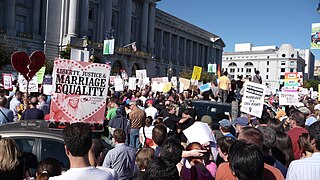
Egalitarianism, or equalitarianism, is a school of thought within political philosophy that builds on the concept of social equality, prioritizing it for all people. Egalitarian doctrines are generally characterized by the idea that all humans are equal in fundamental worth or moral status. As such, all citizens of a state should be accorded equal rights and treatment under the law. Egalitarian doctrines have supported many modern social movements, including the Enlightenment, feminism, civil rights, and international human rights.

Equality of outcome, equality of condition, or equality of results is a political concept which is central to some political ideologies and is used in some political discourse, often in contrast to the term equality of opportunity. It describes a state in which all people have approximately the same material wealth and income, or in which the general economic conditions of everyone's lives are alike.
Equal opportunity is a state of fairness in which individuals are treated similarly, unhampered by artificial barriers, prejudices, or preferences, except when particular distinctions can be explicitly justified. For example, the intent of equal employment opportunity is that the important jobs in an organization should go to the people who are most qualified – persons most likely to perform ably in a given task – and not go to persons for reasons deemed arbitrary or irrelevant, such as circumstances of birth, upbringing, having well-connected relatives or friends, religion, sex, ethnicity, race, caste, or involuntary personal attributes such as disability, age. According to proponents of the concept, chances for advancement should be open to everybody without regard for wealth, status, or membership in a privileged group. The idea is to remove arbitrariness from the selection process and base it on some "pre-agreed basis of fairness, with the assessment process being related to the type of position" and emphasizing procedural and legal means. Individuals should succeed or fail based on their efforts and not extraneous circumstances such as having well-connected parents. It is opposed to nepotism and plays a role in whether a social structure is seen as legitimate. The concept is applicable in areas of public life in which benefits are earned and received such as employment and education, although it can apply to many other areas as well. Equal opportunity is central to the concept of meritocracy. There are two major types of equality:
The Commission for Racial Equality (CRE) was a non-departmental public body in the United Kingdom which aimed to address racial discrimination and promote racial equality. The commission was established in 1976, and disbanded in 2007 when its functions were taken over by the newly created Equality and Human Rights Commission.
Equal pay for equal work is the concept of labour rights that individuals in the same workplace be given equal pay. It is most commonly used in the context of sexual discrimination, in relation to the gender pay gap. Equal pay relates to the full range of payments and benefits, including basic pay, non-salary payments, bonuses and allowances. Some countries have moved faster than others in addressing equal pay.

The Sex Discrimination Act 1975 was an Act of the Parliament of the United Kingdom which protected men and women from discrimination on the grounds of sex or marital status. The Act concerned employment, training, education, harassment, the provision of goods and services, and the disposal of premises.

The Fourth World Conference on Women: Action for Equality, Development and Peace was the name given for a conference convened by the United Nations during 4–15 September 1995 in Beijing, China.
The Equal Opportunities Commission (EOC) was a QWANGO which was once governed by the Home Office in the United Kingdom which tackled sex discrimination and promoted gender equality. Its last chair was Jenny Watson.
Unia, or the Interfederal Center for Equal Opportunities and the Centre for Equal Opportunities and Opposition to Racism is an independent public institution that fights discrimination and promotes equal opportunities in Belgium.
United Kingdom employment equality law is a body of law which legislates against prejudice-based actions in the workplace. As an integral part of UK labour law it is unlawful to discriminate against a person because they have one of the "protected characteristics", which are, age, disability, gender reassignment, marriage and civil partnership, race, religion or belief, sex, pregnancy and maternity, and sexual orientation. The primary legislation is the Equality Act 2010, which outlaws discrimination in access to education, public services, private goods and services, transport or premises in addition to employment. This follows three major European Union Directives, and is supplement by other Acts like the Protection from Harassment Act 1997. Furthermore, discrimination on the grounds of work status, as a part-time worker, fixed term employee, agency worker or union membership is banned as a result of a combination of statutory instruments and the Trade Union and Labour Relations (Consolidation) Act 1992, again following European law. Disputes are typically resolved in the workplace in consultation with an employer or trade union, or with advice from a solicitor, ACAS or the Citizens Advice Bureau a claim may be brought in an employment tribunal. The Equality Act 2006 established the Equality and Human Rights Commission, a body designed to strengthen enforcement of equality laws.

The Race Equality Directive 2000/43/EC is a legal act of the European Union, concerning European labour law. It implements the principle of equal treatment between persons irrespective of racial or ethnic group. Since the Treaty of Amsterdam came into force in 1999, new EC laws, or Directives, have been enacted in the area of anti-discrimination, and this directive complements other directives on gender and age, disability, religion and sexual orientation.

The Equality Act 2006 is an Act of the Parliament of the United Kingdom covering the United Kingdom. The 2006 Act is a precursor to the Equality Act 2010, which combines all of the equality enactments within Great Britain and provide comparable protections across all equality strands. Those explicitly mentioned by the Equality Act 2006 include age; disability; sex; proposed, commenced or completed gender reassignment; race; religion or belief and sexual orientation. The changes it made were:

The Equality Commission for Northern Ireland is a non-departmental public body in Northern Ireland established under the Northern Ireland Act 1998. "The Commission is responsible for implementing the legislation on sex discrimination and equal pay, race relations, sexual orientation, age, religious or similar philosophical belief, political opinion and disability. The Commission’s remit also includes overseeing the statutory duties on public authorities to promote equality of opportunity and good relations under Section 75 of the Northern Ireland Act 1998."
Equality and diversity is a term used in the United Kingdom to define and champion equality, diversity and human rights as defining values of society. It promotes equality of opportunity for all, giving every individual the chance to achieve their potential, free from prejudice and discrimination.

The Equal Opportunities Commission (EOC) is a public body in Hong Kong that investigates discrimination complaints and promotes equality. It was created in 1996 as the city's first semi-governmental agency focused on sex discrimination. Its scope has since been expanded to include protecting groups based on race, disability, and family status.

Equinet is the European Network of Equality Bodies. It serves as a professional platform for cooperation, capacity building and peer support amongst Equality Bodies around the legal interpretation and implementation in practice of the EU equal treatment Directives and around the promotion of equality and the elimination of discrimination.

The Hong Kong Pride Parade is an annual march in Hong Kong in support of LGBT rights. Homosexuality has been legal in Hong Kong since 1991 but there is no legal recognition of any same-sex relationships and limited protection against discrimination.

Social equality is a state of affairs in which all individuals within society have equal rights, liberties, and status, possibly including civil rights, freedom of expression, autonomy, and equal access to certain public goods and social services.
Declaration of Mexico on the Equality of Women and their Contribution to Development and Peace 66/34 was a United Nations resolution that was adopted on July 2, 1975, at the close of the International Women's Year World Conference on Women held in Mexico City. The resolution was adopted to promulgate a set of principles concerning the equality of men and women. The Declaration called for action to immediately address the burdens and discrimination women experienced in the labor market, as primary childcare providers, and as political participants around the world.

Substantive equality is a substantive law on human rights that is concerned with equality of outcome for disadvantaged and marginalized people and groups and generally all subgroups in society. Scholars define substantive equality as an output or outcome of the policies, procedures, and practices used by nation states and private actors in addressing and preventing systemic discrimination.













